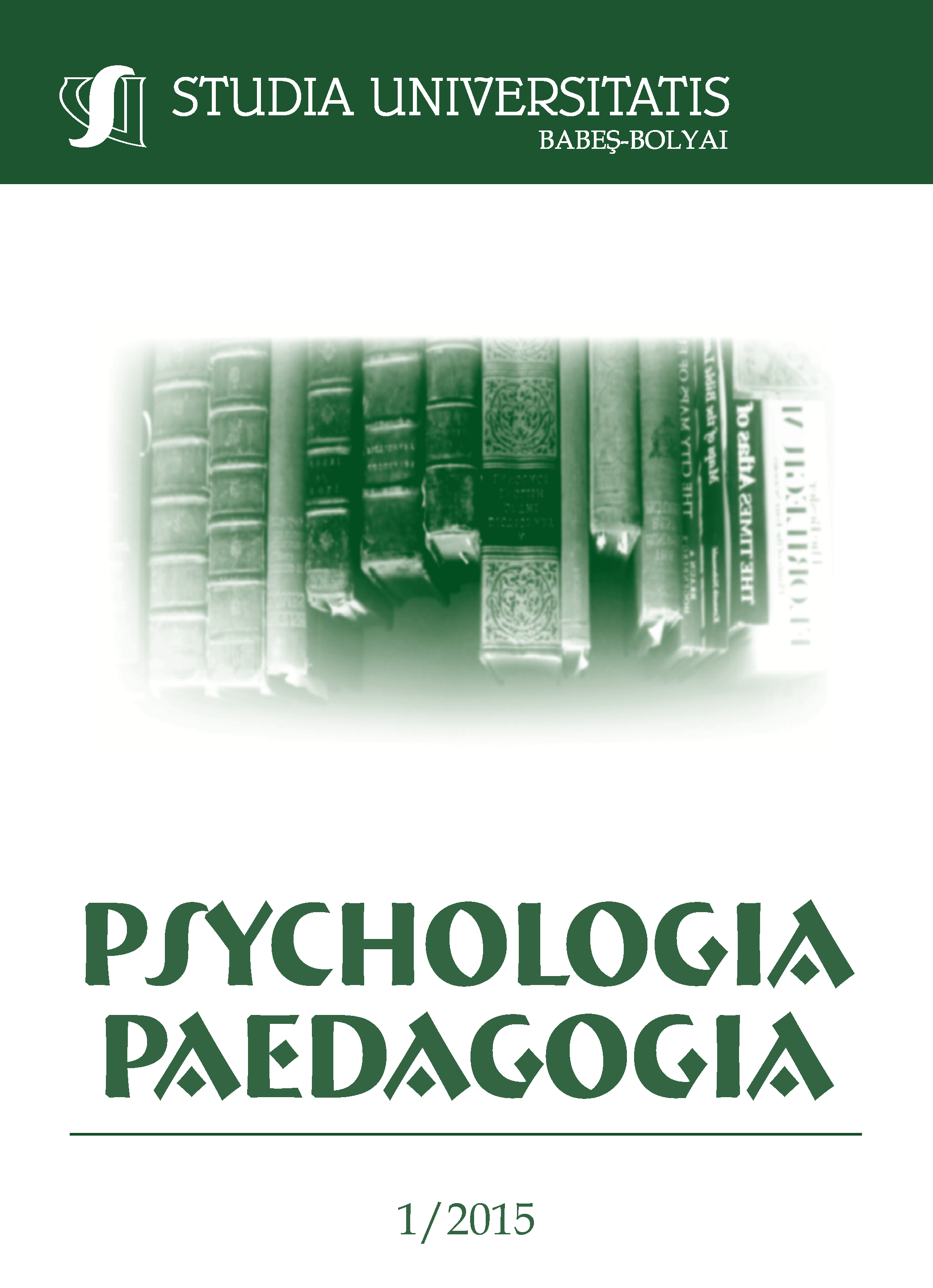AN INTERVENTION PROGRAM FOR THE DEVELOPMENT OF LEARNING TO LEARN COMPETENCY OF 11TH GRADE STUDENTS WITH LEARNING DIFFICULTIES IN STUDYING ROMANIAN LANGUAGE AND LITERATURE
Keywords:
intervention program, the learning to learn competency, learning difficulties, critical reflection, metacognitive reflection, strategic decision making.Abstract
Education and training have to provide the learning environment for the development of learning to learn competency for all citizens, including those with fewer opportunities. The main purpose of the formative experiment proposed in this paper was to develop and implement a formative intervention program focused on developing an operational model of learning to learn competency on cognitive, metacognitive and non-cognitive dimensions for 11th grade students with learning difficulties at Romanian Language and Literature. The sample of subjects consisted in 106 students of 11th grade with learning difficulties from three technical high schools and colleges. Using critical reflection, metacognitive reflection, strategic decision making and training subjects in complex, analytical and creative learning situations with interdisciplinary links in an articulated intervention program proved to be efficient in activating and optimizing learning behavior and therefore, in decreasing the frequency learning difficulties. The statistically significant differences between pretest and posttest results in conjunction with developments, highlighted by quantitative and qualitative benchmarks, of subjects in the experimental group during the formative intervention allow us to appreciate that the assumption underlying the experimental study was validated.
Zusammenfassung. Erziehung und Bildung sollen für alle Bürger, einschließlich jener, die geringere Möglichkeiten haben, das Lernumfeld für die Entwicklung von Lernkompetenz anbieten. Der Hauptzweck der formativen Experiment, das in diesem Beitrag vorgeschlagen wird, war einen formativen Interventionsprogramm zu entwickeln und durchzuführen. Das formative Interventionsprogramm konzentriert sich auf einem operatives Modell für die Lernkompetenzentwicklung in Bezug auf den kognitiven, metakognitiven, nicht-kognitiven Dimensionen bei den Schülern mit Lernschwierigkeiten in der rumänischen Sprache und Literatur in der elfte Klasse. Die Teilnehmer an diesem Experiment sind 106 Schüler mit Lernschwierigkeiten. Sie sind in die elfte Klasse an drei Gymnasien und Fachhochschulen. Die Verwendeung von kritischer, metakognitiver Reflexion, strategischen Entscheidungsfindung und der Einbindung der Teilnehmern in komplexen, analytischen, kreativen Lernsituationen, mit interdisziplinären Verbindungen im Rahmen von dem Interventionsprogramm, haben die formative Wirksamkeit beweist, indem das Lernverhalten aktiviert und optimiert wurde. Folglich, hat die Häufigkeit von den Lernschwierigkeiten abgenommen. Statistisch signifikante Unterschiede zwischen Pretest- und Posttestergebnisse im Zusammenhang mit den Entwicklungen, bei quantitativen und qualitativen Niveau, den Personen in der Experimentalgruppe, während der formativen Intervention erlauben uns zu schätzen, dass die Hypothese der experimentellen Studie bestätigt wurde.
Schlüsselwörter: Interventionsprogramm, Lernkompetenz, Lernschwierigkeiten, die kritische Reflexion, die metakognitive Reflexion, strategische Entscheidungsfindung
References
Bocoș, M. (2003). Cercetarea pedagogică. Suporturi teoretice și metodologice, Editura Casa Cărții de Știință, Cluj-Napoca.
Bocoș, M.-D. (2013). Instruirea interactivă, Editura Polirom, Iași.
Chiș, V. (2005). Pedagogia contemporană-pedagogia pentru competențe, Editura Casa Cărții de Știință, Cluj-Napoca.
Ezechil, L. (2010). Arguments for Developing Reflective Practice in Higher Education, 4th International Conference "Education Facing Contemporary World Issues", Pitești.
Glava, A. (2009). Metacogniția și optimizarea învățării. Aplicații în învățământul superior, Editura Casa Cărții de Știință, Cluj-Napoca.
Gordon J., Halasz G., Krawczyk M., Leney T., Michel A., Pepper D., Putkiewicz E., Wiśniewski J. (2009). Key competences in Europe: opening doors for life-long learners across the school curriculum and teacher education, CASE-Center for Social and Economic Research.
Hofmann, P. (2008). Learning to learn: a key-competence for all adults?, Convergence, 41(2–3), accesat la
http://splet03.izum.si:2105/docview/204605679/fulltextPDF/13C539DB7CC7ECFD72B/1?accountid=31309.
Hoskins, B., Fredriksson, U. (2008). Learning to Learn: What is it and can it be measured? Joint Research Centre – Institute for the Protection and Security of the Citizen, Luxembourg: Office for Official Publications of the European Communities, CRELL.
Jonassen, D., Howland, J., Marra, R., Crismond, D. (2008). Meaningful Learning with Technology, (3rd edn). Upper Saddle River, New Jersey: Pearson Education.
Manolescu, M. (2010). Pedagogia competențelor – o viziune integratoare asupra educației, in Revista de Pedagogie nr. 58 (3).
Mokhtari, K., Reichard, C.A. (2002). Assessing Students’ Metacognitive Awareness of Reading Strategies, Journal of Educational Psychology Vol. 94, No. 2.
Pintrich, P. R., Smith, D. A. F., Garcia, T. & McKeachie, W. J. (1991). A manual for the use of the Motivated Strategies for Learning Questionnaire (MSLQ) (Technical Report No. 91-B-004), Ann Arbor, MI: University of Michigan, National Center for Research to Improve Postsecondary Teaching and Learning.
Rey, B., Carette, V., Defrance, A., Kahn, S., Pacearcă, Ș. (2012). Competențele în școală. Formare și evaluare, Editura Aramis Print, București.
Schraw, G. & Dennison, R. S. (1994). Assessing Metacognitive Awareness. Contemporary Educational Psychology, 19, 460-475.
Vianin, P. (2011). Ajutorul strategic pentru elevii cu dificultăți școlare, Editura ASCR, Cluj-Napoca.
*** European Parliament and Council of the European Union. (2006). Recommendation of the European Parliament and of the Council of 18 December 2006 on key competences for lifelong learning, Official Journal of the European Union, Bruxelles accessed at http://eur-lex.europa.eu/legal-content/EN/TXT/?uri=celex:32006H0962.
Downloads
Published
How to Cite
Issue
Section
License
Copyright (c) 2015 Studia Universitatis Babeș-Bolyai Psychologia-Paedagogia

This work is licensed under a Creative Commons Attribution-NonCommercial-NoDerivatives 4.0 International License.





